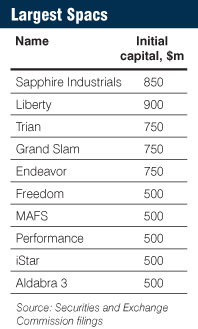 Liz Moyer 12.20.05, 7:39 AM ET
Liz Moyer 12.20.05, 7:39 AM ET
New York -Blank check companies are proliferating, though just eight of the several dozen that have been formed have remotely succeeded in their original missions.
These companies -- shells, really, that promise they will take investors' money and use it to buy real companies -- are effectively Wall Street's Wild West.
There are 39 of these companies in registration to sell shares to the public, including 32 that have filed with the Securities and Exchange Commission just since July 1. Several are seeking listings on the American Stock Exchange, where four already trade. The total capital expected to be raised in these stock offerings is nearly $3 billion.
They are also popping up in Europe, where two have begun trading on the alternative marketplace of the London Stock Exchange (which, incidentally, is itself publicly traded).
But investors, mainly value fund investors, hedge funds and high-net-worth individuals, aren't getting much for their money. These blank check companies, also known as special purpose acquisition corporations, have no operations or businesses. Instead, they are set up with the support of private equity investors with the goal of acquiring a business within a specific time frame.
In most cases, the name of the CEO is all a SPAC has going for it. On Friday, Star Maritime Acquisition Corp. raised $188 million in its listing on the American Stock Exchange. It is run by a group of executives who have a high profile in the shipping business, though they aren't necessarily household names. Its chief executive is Prokopios Tsirigakis.
Also on Friday, shares of Boulder Specialty Brands joined the crowd of SPACs that trade on the over-the-counter bulletin board market, or pink sheets, where most of them are to be found. The Longmont, Colo., company run by chief executive Stephen Hughes, a food industry executive, raised $136 million.
Among those in registration and preparing for a listing on the American Stock Exchange: Endeavor Acquisition Corp., run by Eric Watson, a New Zealand investor, and Jonathan Ledecky, a private equity manager and the founder and former chief executive of US Office Products. Endeavor's board of directors includes Edward Mathias, the founder of buyout shop Carlyle Group. It is looking to raise $200 million.
Then there is Acquicor Technologies, founded by former Apple Computer executive Steve Wozniak and others and looking to raise $150 million to buy in the technology, multimedia and networking sectors.
Around since the 1990s, SPACs have exploded in popularity in the last couple of years as hedge funds and other institutions and individuals scour for the next great thing that has gone unnoticed by Wall Street. They are raising far more than the $20 million to $50 million that used to be typical, and they are attracting the interest of deal makers at large investment banks, like Citigroup and Deutsche Bank--a niche where boutiques once dominated.
Citigroup underwrote the Boulder Specialty deal, along with Roth Capital. Deutsche Bank is the underwriter behind a pending $150 million IPO being arranged for Grubb & Ellis Realty Advisors, which aims to buy commercial real estate properties.
read more >>> view article.




















